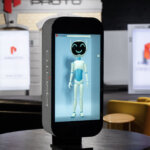AI on the front desk – pros and cons of business avatars
|
Getting your Trinity Audio player ready...
|
Virtual agents, social robots, metahumans, digital avatars – there are a few more terms for firms to add to their business lexicon as AI continues its march into workplaces. Contact centers already benefit from AI-powered enterprise software that can help human agents serve customers more efficiently, but can applications go one step further? Front desk AI is available now, but there are some hospitality fundamentals for companies to consider before signing up.
Can front desk AI add the metahuman touch?
The list of providers offering humanoid digital avatars grows by the day. Most recently, bitHuman came out of stealth mode to offer what it describes as a ‘game-changing interactive AI platform for enterprise customers’.
Backed by US VC firm Zelda Ventures, which is led by Suzanne Fletcher and has reportedly raised more than USD 30 million since debuting just over a year ago, bitHuman’s first digital product is a 24/7 service agent dubbed neo.
Sci-Fi getting closer to reality every day! @zelda_ventures portfolio company BitHuman introduces lifelike AI agents for enterprises! https://t.co/1xGIgsDG7z via @VentureBeat
— Suzanne R Fletcher (@SRFtweets) December 14, 2023
If the business avatar were a human staff member, it’d be hard not to be impressed. According to bitHuman, neo speaks multiple languages, has cultural awareness, is helpful with many tasks, and supports both customers and employees.
Front desk AI is one use case for the photo-realistic virtual agent, which can respond in real-time to queries, but the range of applications for the business avatar goes beyond reception duties.
“Imagine having a personal shopping assistant in a retail store, or an HR associate available all day to support your employees as they onboard,” said Efe Akengin, Head of Product at bitHuman, as details on potential markets went public.
Neo has already found work as a concierge at Panama Tower – the largest skyscraper in Miami, US – and will certainly have novelty appeal for condo guests entering the building. But will having front desk AI suit all businesses?
Hospitality fundamentals
In his hugely popular TED talk, ‘The Ingredients of Great Hospitality’, New York, US, restaurateur Will Guidara shares some words of wisdom on being able to offer diners a highly-personalized experience.
Guidara owned and operated Eleven Madison Park, a fine-dining restaurant in the heart of New York City, for almost a decade and helped to transform the business from what he describes as a ‘middling brasserie’ to being named as the number one restaurant in the world.
On TechHQ, we’ve written previously about how AI could make it possible – through the use of digital agents – for enterprises to offer bespoke client services on a scale that would be cost-prohibitive using human staff. But the technology could misfire if it doesn’t prioritize the fundamentals of what customers are looking for.
“…In restaurants, our reason for being is to make people feel seen. It’s to make them feel welcome. It’s to give them a sense of belonging,” Guidara tells TED talk viewers, recalling one of his most important lessons. “In restaurants, the food, the service, the design – they are simply ingredients in the recipe of human connection.”
To Guidara, human connection is hospitality. And it’s an observation that may serve as a cautionary tale to firms that lean too hard on AI and automation to ramp up their operations.
What’s more, while fine dining may sound far removed from your area of business, recall that service industries drive the bulk of US GDP.
“Globally, it’s more than 65%,” Guidara points out to the audience. “That means that whether you’re in real estate, or retail, or construction, or finance, or insurance, or computer services, you do the same thing for a living that I do.”
Today, there’s a long list of companies that are in the business of serving other people, and – in Guidara’s opinion – there are lots of opportunities for firms to learn from how highly-rated restaurants do things.
Human connections may be highly prized, but that doesn’t mean that front desk AI automation is off the table. However, businesses need to be confident that they really understand what’s at the top of a customer’s wish list before directing that request to a digital agent.
Fast-food restaurants have been quick to adopt AI-powered technology for taking drive-through customer orders and performing other duties. And where offering a speedy service is key, digital business avatars may trump the human touch. Plus, given how realistic-sounding and responsive the technology is becoming, some diners may not even realize that they’re talking to a digital agent.
There are staffing considerations too. Companies that can’t find enough staff to run operations manually have the option of using AI tools to keep their business open for longer. Today, there are robot-powered coffee bars that take that concept to the extreme, making it possible for a manager to supervise around ten outlets.
Clients may prefer interacting with a human agent, but most would take the convenience of prompt 24/7 customer service even if it meant interacting with an avatar outside of normal business hours. It also means that companies don’t run the risk of missing a customer call – a point made by Concerto, which augments small business front desk operations with AI solutions.
How to create a front desk AI agent?
Interactive AI avatar firm D-ID offers insight into the inner workings of business avatars. Users question the agent, which dips into a custom knowledge base for content and context, and then feeds the resulting prompt into an LLM to create its response using generative AI.
Aimesoft has an example of virtual receptionist software on its website – which is capable of welcoming visitors, advising on meeting room whereabouts, and giving floor information. Multimodal, the application can accept voice or text inputs and remembers faces to tailor output to individuals.
There’s a strong case for using front-desk AI when it adds to the experience. For example, not every company will have a human receptionist on its payroll. And having a business avatar could allow visitors to be safely let into company premises, informing their business contact of their arrival, without another staff member having to get up and deal with the door buzzer.
On the other hand, companies that pride themselves on exceptional customer service – tracking back to Guidara’s wisdom on getting ahead in fine dining – may want to think more deeply before hiring a hologram.
Keeping customers in the loop
It’s possible that front desk AI could be made part of the show – Emmersa boasts hyper-realistic avatars. But if clients have become used to seeing a familiar human face, they may be thrown by an all-new digital experience without an explanation for the switch in strategy.









